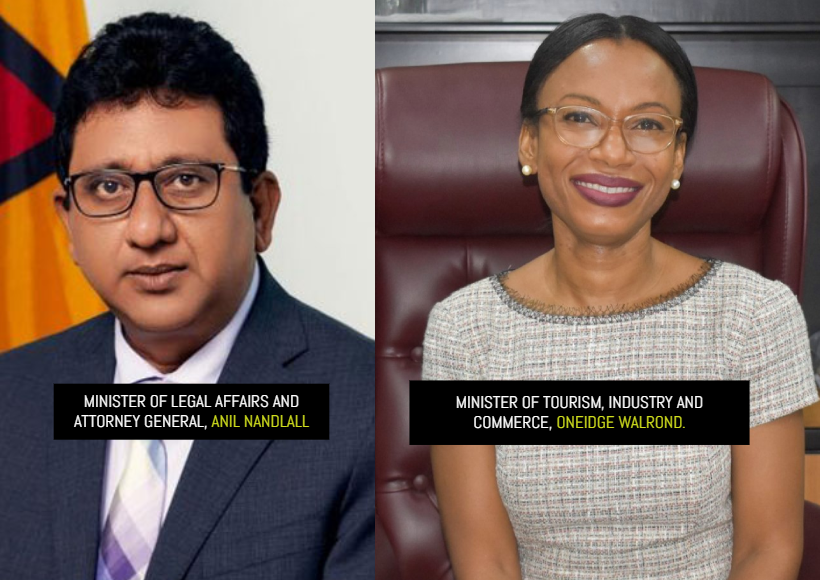By Abena Rockcliffe
Eager to perform well in the game of “catch-up” with the modern world, the Government of Guyana on Thursday night, and into the wee hours of Friday morning, pushed through a slew of legislation; all critical in their various respects.
Amongst the pieces of legislation debated and passed in the National Assembly during the over 16-hour sitting, was the Electronic Communications and Transactions Bill taken to the House by Minister of Tourism, Industry and Commerce, Oneidge Walrond.
Walrond hailed the bill as essential for the modernization of the state, making it “responsive to the demands of the 21st century.”
She noted that the absence of legislation has hindered the development of e-commerce and the implementation of e-governance.
Walrond’s bill caters primarily for the legal recognition of electronic transactions, the specification of technology requirements, and the establishment of an administrative framework.
The APNU+AFC Members of Parliament (MP) who spoke to the bill collectively admitted that it is an important piece of legislation but opined that it is severely lacking in many ways. They also voiced concerns to the effect of it being a difficult change for the elderly, and those who are distrusting of electronic transactions.
Specifically, APNU’s Devin Sears said a lot of the concerns on that side of the House had to do with consumer protection. He questioned if the government is ready to work on building public trust in electronic transactions. On that front, Sears put forward a series of questions likely to be on the minds of those with aversions to electronic communication.
“How can the parties be sure who sent an electronic message or who signed an electronic record; how can the parties be sure that the record has not been altered since it was created; are the electronic records sufficiently trustworthy such that it will be enforced by a court?”
The aforementioned are a few of the questions put forward by the young parliamentarian.
Sears–like his colleagues in opposition who spoke on the merits of the bill—Catherine Hughes and Nima Flue-Bess–said that the Bill ought to be sent to a Special Select Committee for greater analysis and input from stakeholders. He said that major telecommunication companies, the Consumer Affairs Commission, the Bureau of Standards and the Private Sector Commission ought to have a say.
When Attorney General and Minister of Legal Affairs, Anil Nandlall took the podium to commend the bill, he said that the reservations of the opposition MPs are “reasonable” but not well grounded. According to Nandlall, much of the criticism made about the bill reflected a lack of understanding of what it entailed.
The Minister of Legal Affairs said the bill simply seeks to create the legal framework for, and bring regularity to, transactions that are already ongoing.
Further, he said that much of the concerns aired by opposition MPs regarding fraudulent activities are lacking merit as most fraud that can occur electronically can likewise occur manually.
He pointed to AFC’s Cathy Hughes’ concern about forged digital signatures and simply quipped, “It can be forged manually too.”
Nandlall cautioned that the bill cannot be read in isolation as it “simply allows for transactions that are done manually to be done electronically.” He said that it is therefore obvious that the bill will benefit from existing laws like the Cyber Crime and Data Protection Acts stressing “it is a framework.”
Nandlall further stated that the bill will accelerate Guyana’s move from a cash-based economy to plastic, an undertaking that has been long in the making. He noted that under the new dispensation, persons will no longer have to carry around cash to pay for their house lots, they can pay electronically. That same system, he said, will be employed by state agencies across the land. The MP noted that such transactions will provide ease and limit incidents of ‘choke and rob.’
Further, Nandlall said the bill, which has been in its embryonic stages since 2009, is in receipt of international expert opinion as there is no one locally with the expertise to draft such a bill, “not even me.”
Meanwhile, Prime Minister, Brigadier (Ret’d) Mark Phillips, said the bill aims to foster trust and confidence in electronic transactions while safeguarding the integrity of Guyana’s digital ecosystem.
“This bill sets the stage for the legal recognition of electronic communications and transactions, signaling the government’s commitment to embracing technological advancement. It ensures that electronic records hold the same legal standing as the paper counterpart, thus installing confidence in businesses and individuals to embrace electronic methods of communication and record-keeping,” he said.
Moreover, to accommodate citizens who may not have access to electronic means of communication, transaction and record-keeping, the bill also emphasizes the need for access to information in hard-copy form when required.
“This measure ensures that these citizens are not left behind in this digital transformation, and ensures that all citizens can participate in this digital era,” PM Phillips added.
Notably this bill is also expected to facilitate the implementation of e-governance, providing the platform to enhance the efficient delivery of government services, especially with regard to electronic record-keeping and retrieval.











